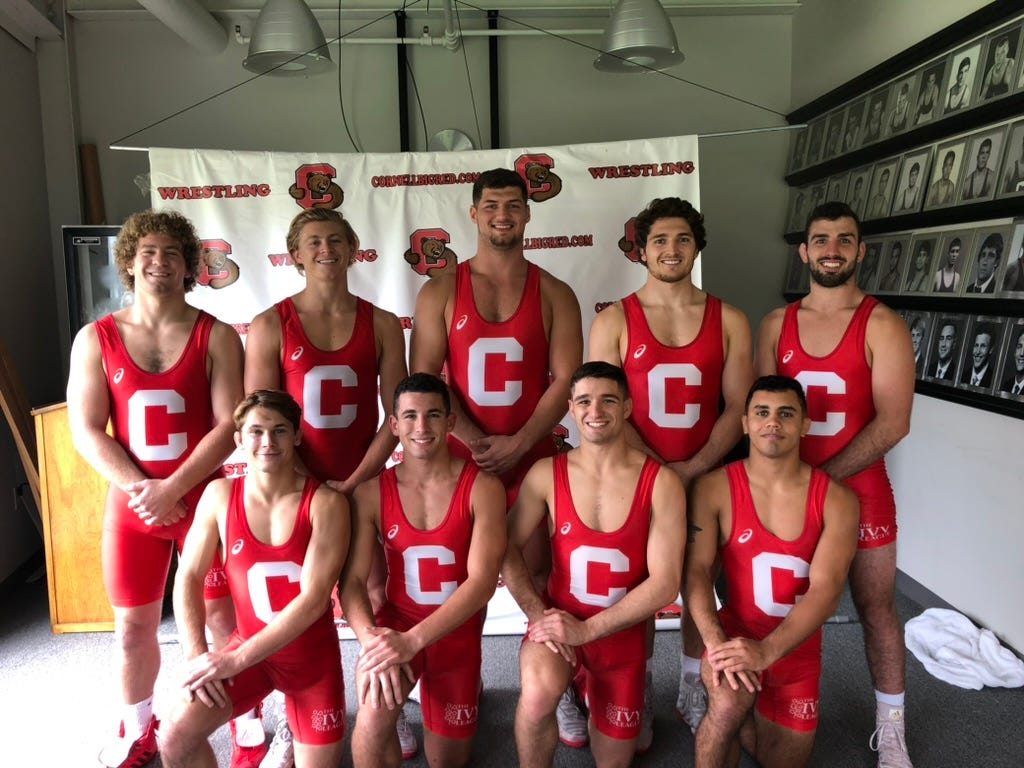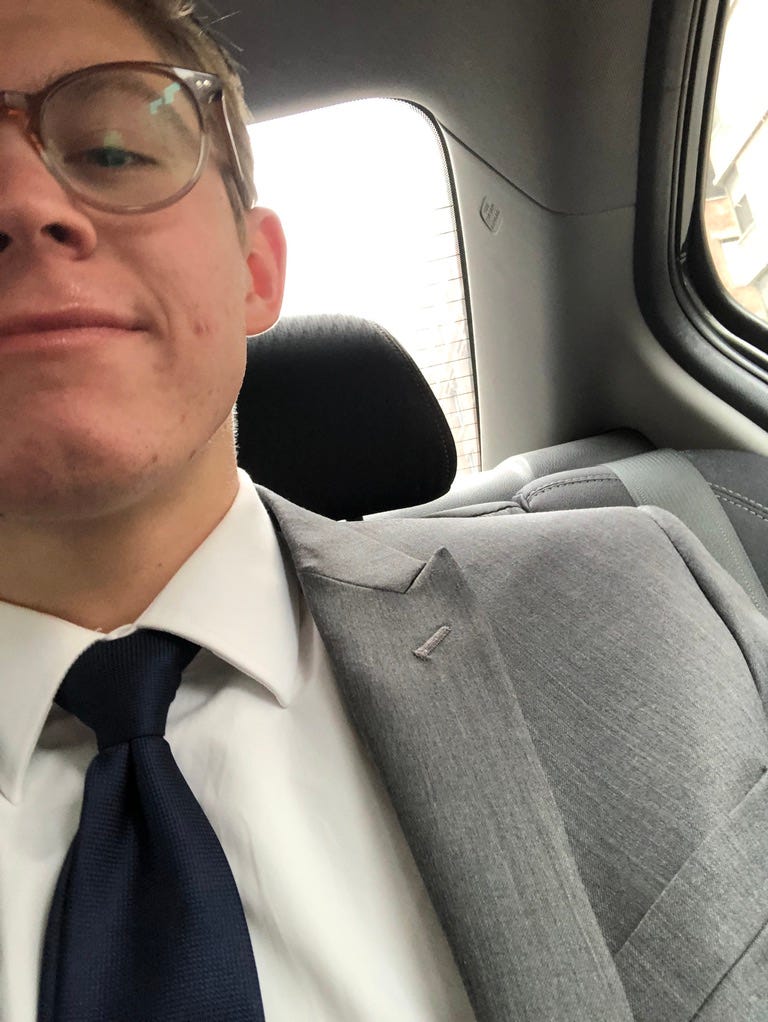The diploma arrived in a cardboard tube two weeks after commencement; if it weren’t for the recent events, I would have assumed it was some sort of poster. I opened it on the kitchen table while my roommates ate eggs over rice and played beer pong. Inside: expensive paper, embossed seal, Latin phrases. Outside the window, a teammate was loading his room and clothes into the back of his Subaru Forester, eager to get home.
I had graduated and proceeded through the ceremonial motions in borrowed robes. Designed to level class distinctions? And I emerged into post-collegiate life having learned that the purpose of higher education—the transmission of specific knowledge and skills—is far inferior to its actual function of social sorting and credential distribution1.
The diploma went back in the tube. The tube went in the back of the purple MKX. I had no frame for it, no wall to hang it on, no clear reason why that piece of paper mattered.
Before you get any further: this essay is the 3rd Part of a 3 Part Series, if you wish to read Part 1: The Purpose Trap or Part 2: Learning to Want Something, you can access those by clicking the links or accessing my profile!
This realization should have been depressing, and sometimes it was, but it also contained a strange kind of liberation: if the game2 was at least partially rigged anyway, perhaps I could stop feeling that my right to occupy space within it hinged on perfect performance and a defined purpose.
Perhaps purpose, that vague and undefined sensation I’ve been chasing for over a decade, is less about finding the correct path and more about recognizing that all paths contain equal amounts of arbitrariness, meaning, chaos, and order.
The Cultural Pathology
What’s particularly unhelpful about the purpose imperative is how it vilifies the very exploratory wandering that most reliably leads to genuine discovery. American culture (or at least the one I was brought up in) has constructed a bizarre moral hierarchy where the miserable accountant who’s spent thirty years in quiet desperation at the same firm somehow occupies a higher moral/ethical plane than the “flaky” thirty-something who’s worked as a barista, a copywriter, a carpenter’s apprentice, a photographer, and a tour guide while figuring out what actually sustains their interest.
We’ve collectively decided that consistency—even consistently hating many hours of your life—demonstrates superior character to adaptation and exploration.
This thought process becomes increasingly unsustainable as the economy itself demands more flexibility. The irony is that while employers expect workers to “pivot” endlessly, individuals who attempt to chart their own pivots face stigma. Even with supposedly elite credentials—an Ivy League degree and experience in the exclusive industries like corporate law and investment banking—the system offers little tolerance for self-directed exploration3.
The message becomes clear: your purpose is not to find fulfillment but to remain reliably positioned within whatever role the market has temporarily assigned you.
The Radical Act
The truly radical act, then, might be precisely the kind of purposeless wandering I once practiced instinctively as a teenager in Michigan, not adolescent rebellion, but a deliberate rejection to commit to paths that have neither earned nor deserved our loyalty.
I think about those veteran wrestling refs, finding meaning in a corner of human experience nobody else valued. I think about the way I felt most grounded at Cornell, not in the classroom but at 2nd Dam, going airborne before hitting icy water. I think about how the chaos of my Michigan adolescence, reckless, unstructured, and seemingly pointless, created something more durable than any carefully plotted five-year plan ever could.
Purpose, I have come to believe, is inherently chaotic. It adds abstraction to meaning and fouls self-perception. While seemingly innocent, for me it didn’t create clarity, it created disorder, and I think it did that for many others as well, another piece of straw that breaks the American youth’s goddam back. The people who “find it” are granted immunity from appearing directionless. It’s a socially sanctioned form of neurosis, the acceptable delusion that lets certain people’s existential flailing look like ambition.
What Wrestling Actually Taught Me
Wrestling taught me something the guidance counselors never mentioned: that practice matters more than purity of purpose. That showing up to the room every day, even when you’re going 0-2 at tournaments, creates something that no amount of strategic planning can replicate. That sometimes the goal conflicts with greatness, and you have to choose, and choosing the goal isn’t always the noble choice, but at least it might be an honest one.
I knew I wasn’t a national champion-caliber wrestler. I probably wasn’t even a national tournament-making wrestler. But I gave good looks in the practice room, which I have long told myself is a cop-out that comes with some residual respect because I was able to support my teammates. I could have pushed myself harder to compete and fight in the moments that didn’t matter as much. I didn’t do that often enough, but I am proud of the times I did. I think that’s self-defeating and a horrible way to live life, but it did eventually lead to me achieving a goal.
The distinction matters. Purpose would have demanded I become the best wrestler possible. The goal: get into Cornell, allowed me to be strategic about where I invested energy. Purpose is totalizing. Goals are negotiable.
The Corporate Years
After Cornell, I worked roles I didn’t even know existed half a decade earlier. Roles that started thrilling and ended mundane. Each one sold to me as purposeful, meaningful, a step toward something greater. Corporate law. Investment banking. The prestigious firms with the impressive letterhead.
What I learned in those years is that purpose-as-career-path is perhaps the most insidious version of the con. Because unlike the artist or the activist or the teacher—people who at least chose their suffering consciously—the corporate striver suffers under the delusion that their misery is temporary, that just one more promotion, just one more year of grinding, will finally deliver the purpose they were promised.
It doesn’t. The purpose keeps receding. And meanwhile, you’ve spent your twenties optimizing someone else’s quarterly earnings while your own life atrophies in the margins4.
I don’t say this with bitterness; I guess partially, I do, but I’ve earned it. I made the choices I made with open eyes, or as open as they could be, given everything I’ve described. But I also recognize that I had choices many people don’t. The fact that I eventually walked away from those prestigious roles is itself a form of privilege.
Coming Full Circle
I’m 295 now, at the time of this writing. Still young enough that the “youth” designation in my early rants about purpose might technically apply, but old enough to feel the weight of decisions made and opportunities closed. Old enough to recognize that the purposeless chaos of my Michigan adolescence wasn’t something to escape but something to honor.
The recklessness had value. The drifting had purpose; it had something better than purpose: presence. We were present in our bodies, in our friendships, in our immediate experience of being alive. We weren’t optimizing for future outcomes. We were just living.
Somewhere between that green Oldsmobile Intrigue and the Cornell acceptance call and the corporate years that followed, I learned to mistake anxiety for ambition, tunnel vision for virtue, suffering for significance. I learned to value the appearance of purpose over the reality of living.
The Question of Worth
Worth it? In parts. Wrestling told the truth; Cornell told a story. I can point to the seal on the paper and the fillings in my molars and say both are evidence.
Here’s the only claim I trust: Purpose is the landing. Goals are the map. Practice is the air. I choose air.
Photo with all the teammates I lived with during my senior year of college. Wouldn’t trade anything for this time.
Post-practice, one of my last Cornell practices ever, in early March of my senior year.
On my way to my interview for a corporate legal assistant role in 2019, I had a lot of good experiences in this role, but the growth potential without a JD was limited, the hours were long, and at the time, I hated billing hours.
Devestatingly ironic and clear proof of my naivety, considering I spent 4 years studying economics related to education, wages, inequities, and employment.
The game of life, more specifically; how we spend our time.
I think we can all agree that anything over a 40-hour work week, for a salaried employee, seems a little bit egregious, yet 60, 70, 80+ hour work weeks seem like a rite-of-passage for these industries. Do we dare ask why?
Check out Jonathan Girma for more on the margin
30 at the time of this edit.






